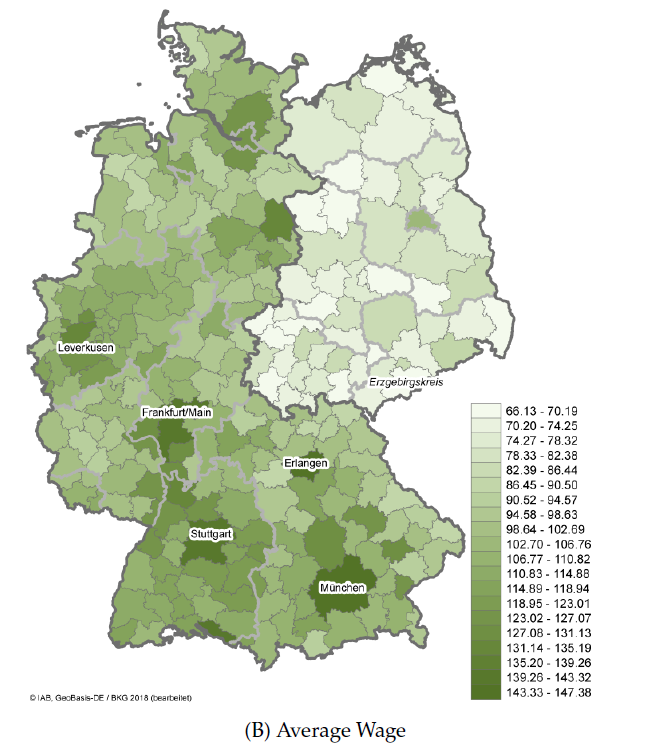
Some good news
"Matching in Cities",
by Wolfgang Dauth, Sebastian Findeisen, Enrico Moretti and Jens Suedekum
has been accepted for publication in the Journal of the European Economic Association @JEEA_News
Paper: drive.google.com/open?id=1oWBLa…
🧵 (1/n)
voxeu.org/article/assort…
"Matching in Cities",
by Wolfgang Dauth, Sebastian Findeisen, Enrico Moretti and Jens Suedekum
has been accepted for publication in the Journal of the European Economic Association @JEEA_News
Paper: drive.google.com/open?id=1oWBLa…
🧵 (1/n)
voxeu.org/article/assort…
It all starts from these 2 graphs:
- Wages strongly differ across regions, mostly btw East and West, but also within West
- those disparities have grown a lot over time
For instance, Munich wages were ~30% above average in the 1980s, but >50% in 2014.
Why is that??? /2

- Wages strongly differ across regions, mostly btw East and West, but also within West
- those disparities have grown a lot over time
For instance, Munich wages were ~30% above average in the 1980s, but >50% in 2014.
Why is that??? /2


Prominent explanations for this "urban wage premium" include
- compensation for higher local prices
- sorting: more productive workers & firms self-select into cities
- agglomeration economies: cities make workers more productive, e.g. as knowledge is concentrated there
/3
- compensation for higher local prices
- sorting: more productive workers & firms self-select into cities
- agglomeration economies: cities make workers more productive, e.g. as knowledge is concentrated there
/3
All of this plays a role in 🇩🇪 as well, but we focus on another, previously under-explored mechanism:
Worker-firm matching works considerably smoother in big cities, even for given "qualities" of workers and firms.
But first: What does quality of workers/firms mean? /4
Worker-firm matching works considerably smoother in big cities, even for given "qualities" of workers and firms.
But first: What does quality of workers/firms mean? /4
We apply a technique popularized by Nobel laureate David Card (et al.). It disentangles individual wages into a worker and a firm component.
E.g., I work at Siemens and earn a lot - how much is due to myself? And how much is attributable to Siemens compensation schemes? /5
E.g., I work at Siemens and earn a lot - how much is due to myself? And how much is attributable to Siemens compensation schemes? /5
Putting those "qualities" on the map, here focusing on the West only, it turns out that big cities like Munich or Frankfurt host the best workers and the best firms.
So, quite naturally, wages are highest there.
But that's not all! Assortative matching comes on top. /6
So, quite naturally, wages are highest there.
But that's not all! Assortative matching comes on top. /6

In big cities like Hamburg, the relatively best workers tend to be in the most high-paying plants, further boosting their wages -> positive assortative matching, PAM
In small cities like Daun, worker-firm matching is all over the place, and it's more random who works for whom /7
In small cities like Daun, worker-firm matching is all over the place, and it's more random who works for whom /7

In other words, the correlation of worker- and plant-qualities is much higher in larger cities, and this pattern is especially visible for specific occupations
The very best architects are tightly matched to the best architectural bureaus in Munich, but not so much in Daun. /8
The very best architects are tightly matched to the best architectural bureaus in Munich, but not so much in Daun. /8

Quantitatively, we find that assortative matching matters a great deal for the evolution of spatial wage disparities.
42% of the cross-sectional variation in regional wages comes from the matching component, and 61% of the increase in regional wage inequality hinges on it. /9
42% of the cross-sectional variation in regional wages comes from the matching component, and 61% of the increase in regional wage inequality hinges on it. /9

That is, matching was more assortative in Munich than in Daun already in the 1980s, but even more so in 2014, rising regional wage inequalities by further boosting Munich wages.
Had the degree of PAM not risen over time, aggregate labor earnings would be 31bn Euros lower. /10
Had the degree of PAM not risen over time, aggregate labor earnings would be 31bn Euros lower. /10

The "new" factor on which we focused in our paper is, therefore, not a small epsilon contribution to understand regional wage differences.
No, matching was a big elephant sitting in the room, but it took a huge amount of data and methodology to discover it. /11
No, matching was a big elephant sitting in the room, but it took a huge amount of data and methodology to discover it. /11
This paper is a piece of basic labor market research and bears no straightforward policy implications.
If anything, we should seek for ways to improve the matching efficiency in small cities, through specific search platforms or the like. But that's for another paper. /12
If anything, we should seek for ways to improve the matching efficiency in small cities, through specific search platforms or the like. But that's for another paper. /12
For the time being, we're happy that another paper of ours made it into the #JEEA and we hope you enjoy reading it.
But now enough about academic research. The🚦coalition treaty is coming up today, and this channel will now revert back to the usual #Schuldenbremse coverage. /END
But now enough about academic research. The🚦coalition treaty is coming up today, and this channel will now revert back to the usual #Schuldenbremse coverage. /END
• • •
Missing some Tweet in this thread? You can try to
force a refresh





